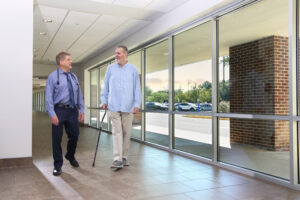Deciding whether to move a parent into assisted living is difficult in the best of times—deciding during a pandemic is even more difficult.
The seemingly obvious choice is to keep your parent at home or living with family. But home can pose risks for seniors too, especially if they:
- Need regular assistance with activities of daily living
- Live alone and have a medical condition that needs to be monitored or one that may require urgent attention
- Are self-isolating and aren’t able to socialize or stay active, which can adversely affect health and well-being
- Live with family members who can’t social distance or isolate
- Have dementia, Alzheimer’s, or another type of memory impairment
When you take into account the safety measures that many senior living communities have implemented, as well as the creative ways they’re keeping residents engaged and active, assisted living may still be the best option.
When deciding whether to move your parent or parents into assisted living, make sure:
1. The state where the assisted living is located has flattened the curve and is holding steady. Also confirm that the community itself has little to no coronavirus cases.
2. A representative from management gives you a guided virtual tour and willingly and thoroughly answers all of your questions.
3. Staff members are tested for COVID-19 weekly and are required to wear personal protection equipment (PPE), such as kn95 masks.
4. Housekeeping routinely cleans and disinfects all surfaces.
5. The staff keeps residents engaged with themed food deliveries and physically distanced outdoor activities like musical performances, family visits, and arts & crafts. Check out the community’s Facebook page to get a real sense of what life is like, how the team interacts with residents, and what residents and their family members have to say about how the community is navigating the pandemic.
6. New residents are tested for COVID-19 prior to and on move in day to ensure a true baseline of two negative tests. They should also be required to quarantine for 14 days starting on the day they move in.
7. Residents can obtain quality health care whenever they need it. It’s definitely a plus if the assisted living is part of a local healthcare system that’s located near the community. This ensures that residents have priority access to health and wellness services, including regular visits from geriatricians on staff at the medical center and nursing staff available on site 24/7.
8. There is staff longevity. From nurses, nursing assistants, and certified medication aides to housekeeping, dining, activities and maintenance staff, it’s good to have experienced team members. A low turnover rate means that staff members develop meaningful relationships with residents and their families, and can easily identify and meet their needs.
9. The community has earned Advanced Standing distinction for at least several years in a row. It’s also a good sign if resident and family satisfaction scores consistently rank high. This type of information can usually be found on the assisted living’s website.
10. The team has developed safe ways for family members to stay in contact with their loved ones whether it is through outdoor, physically distanced get-togethers, or FaceTime and Zoom calls.
If you’re looking for an assisted living facility for your loved one, the award-winning Monmouth Crossing Assisted Living, part of CentraState Healthcare System, meets all of the above criteria. Visit their site or give them a call today to set up a virtual tour— 732-303-8600.





